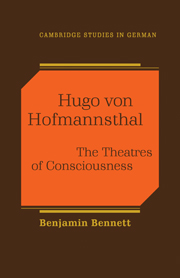Book contents
- Frontmatter
- Contents
- Preface
- Acknowledgments
- List of Abbreviations
- Part I Principles of lyric and drama
- Part II Language and society
- 7 Chandos and his neighbors
- 8 Werther and Chandos
- 9 Hofmannsthal's return
- 10 Missed meetings in Der Schwierige
- 11 Hans Karl's return
- 12 Society as drama
- Part III Culture and collapse
- Conclusion
- Notes
- Index of works
- General index
7 - Chandos and his neighbors
Published online by Cambridge University Press: 04 August 2010
- Frontmatter
- Contents
- Preface
- Acknowledgments
- List of Abbreviations
- Part I Principles of lyric and drama
- Part II Language and society
- 7 Chandos and his neighbors
- 8 Werther and Chandos
- 9 Hofmannsthal's return
- 10 Missed meetings in Der Schwierige
- 11 Hans Karl's return
- 12 Society as drama
- Part III Culture and collapse
- Conclusion
- Notes
- Index of works
- General index
Summary
I intend now to work toward an interpretation of Der Schwierige based on the idea of language and society as primary realities that generate our individual existence, rather than realities that arise as the cumulative result of individuals' existence or actions. Society, in this view, is not an association of individuals; language is not a device used by individuals for communication. Our individuality, rather, is in truth merely an organ by which the social and the verbal realize themselves. This priority of the collective is already a logical consequence of the division of functions between individual and collective consciousness in the poems and early plays; for if collective consciousness were not prior, there would be only a quantitative sense in the distinction. But the logical necessity of an idea is not the same thing as its adequate evocation in the theater, which I contend Der Schwierige aims at. The theater is thus rephilosophized in Der Schwierige, while the goal of actually throwing it open to social reality – the new tentative goal of Theater in Versen – remains out of reach, approachable only by the drastic and dangerous artistic strategies I will discuss in Part III.
Shortly before starting work seriously on Der Schwierige, Hofmannsthal says of Elektra and Jedermann, “In both the concept of personality is questioned, the root of the psychological dramatic” (P3 354). And several years later he applies the same judgment to different works: “All of my pieces adapted from antiquity have to do with the dissolution of the concept of individuality” (A 201).
- Type
- Chapter
- Information
- Hugo von HofmannsthalThe Theaters of Consciousness, pp. 105 - 128Publisher: Cambridge University PressPrint publication year: 1988



